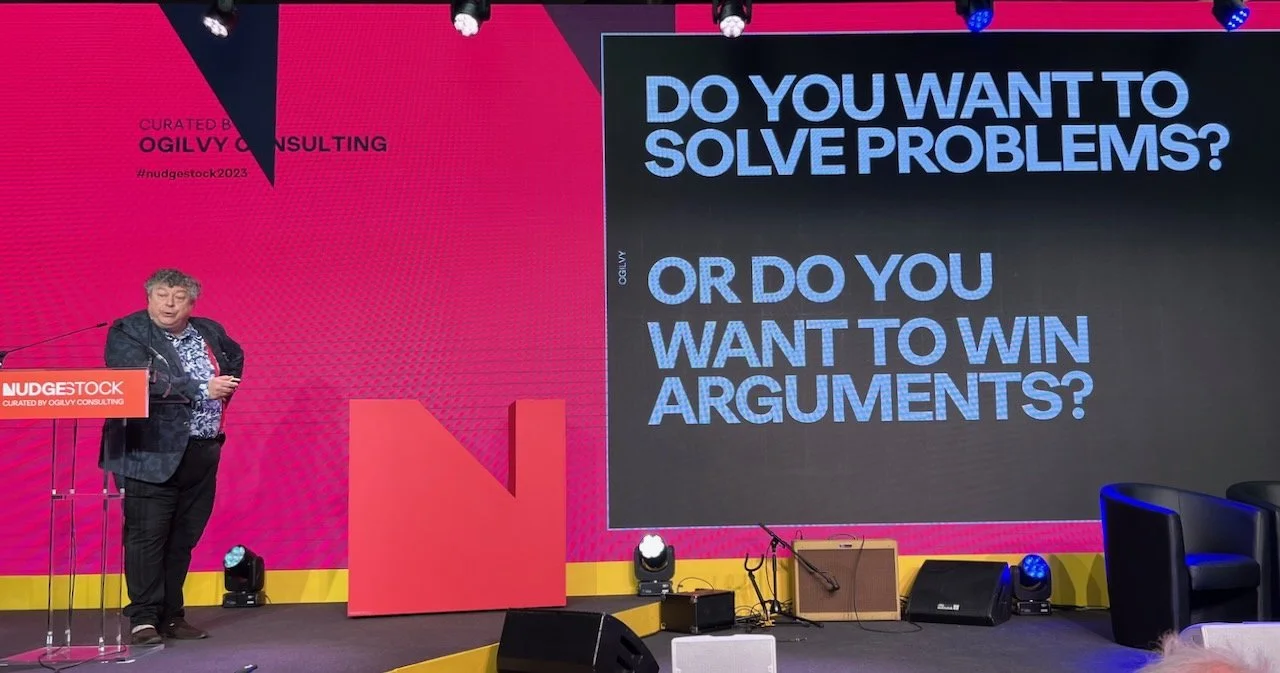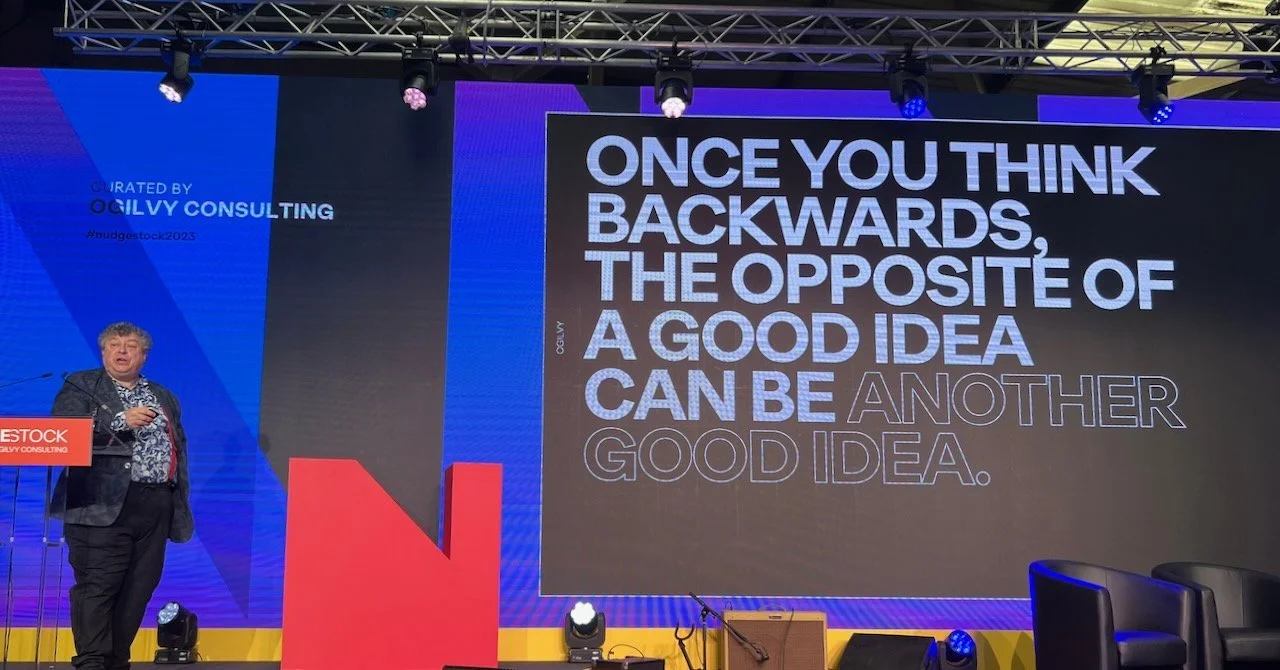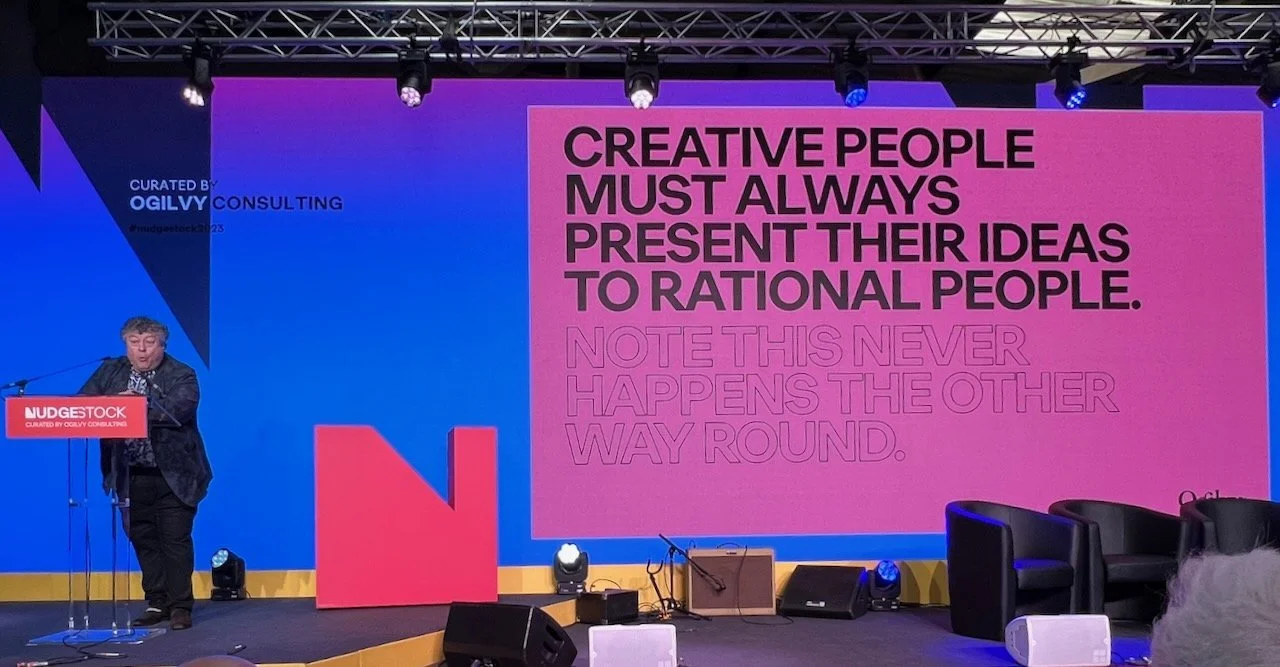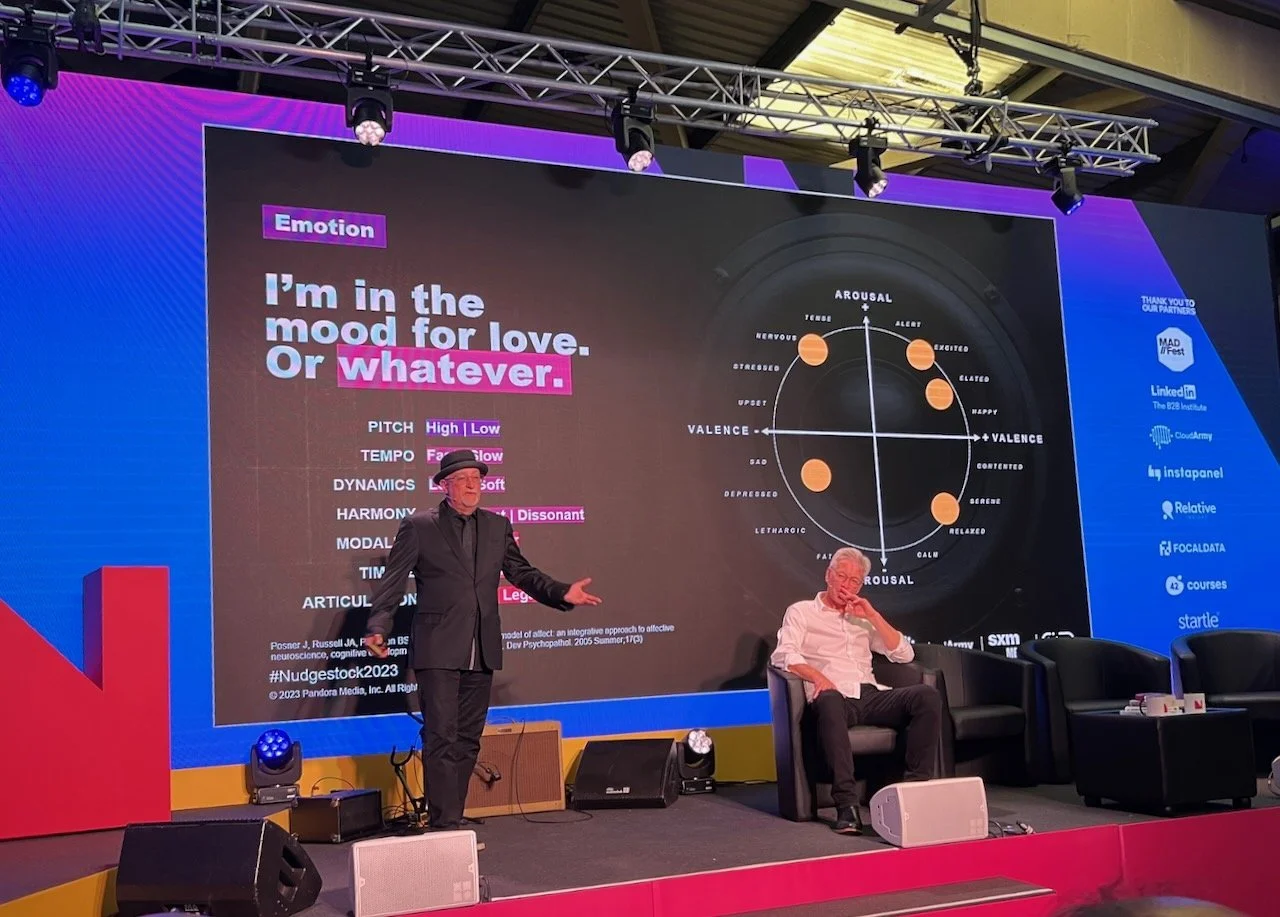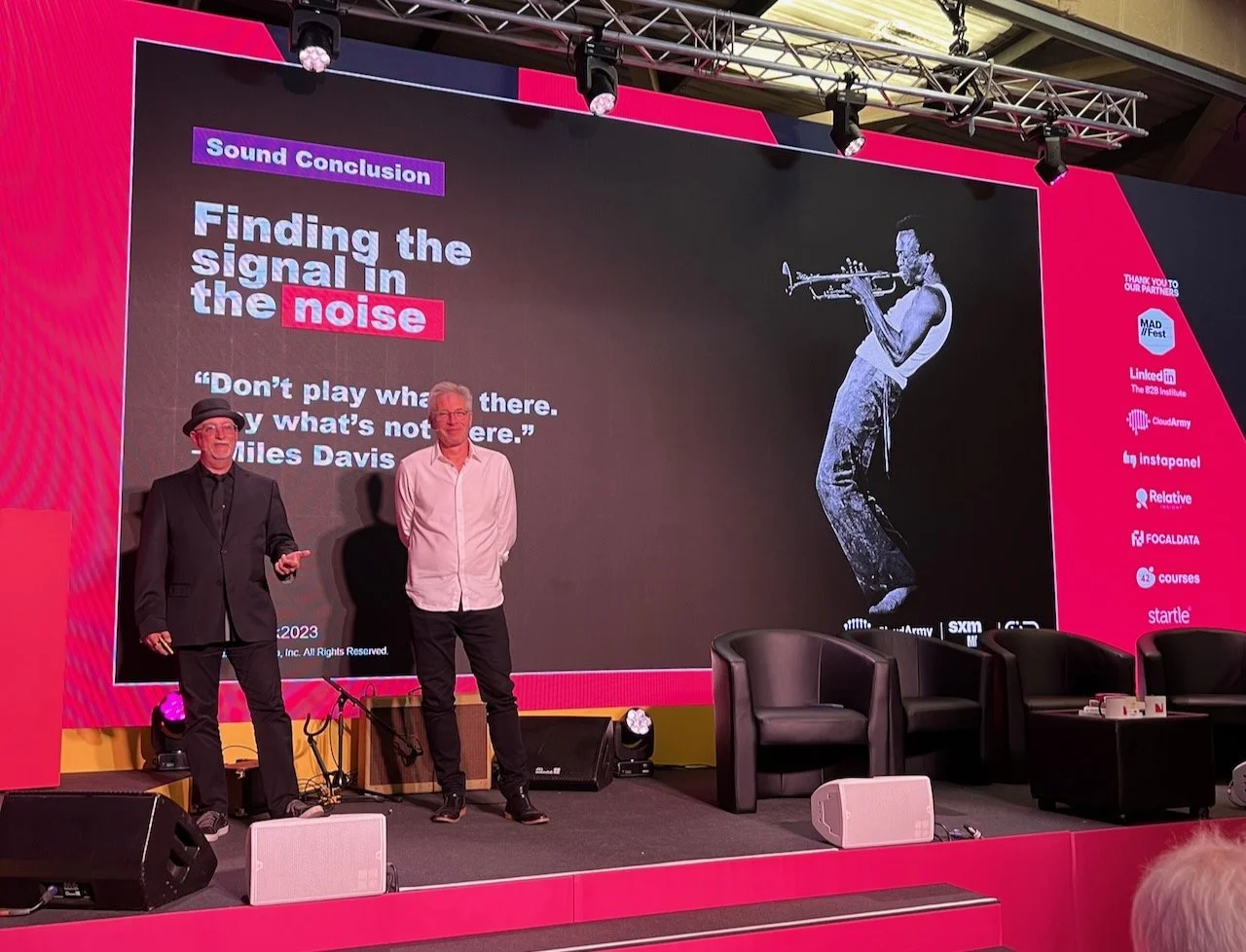Nudgestock 2023 - The Festival of Behavioral Science & Creativity
As the festival of behavioral science and creativity, it's no surprise that every little detail of Nudgestock 2023 was thoughtfully designed to deliver the ultimate experience.
THE THEME THIS YEAR: MESSY
A jazz trio on stage, playing upbeat tunes as "Nudgestockers" are welcomed into the space to take their seats. The room was buzzing with the excitement of finally meeting in person again, after a few years of online-only conferences.
Following a 60-second countdown on the screen, we were all asked to stand up and take the NudgeStock pledge. The prompts on the screen, which we were all reading out loud, asked us to keep an open mind, connect with each other, and form our own opinions. I love the idea of setting intentions, together.
The content was carefully curated by Ogilvy. Stories and case studies demonstrated the integral role of creativity and behavior science to harness the mess to solve problems, tackle social issues, and revive brands. We loved the sessions on our messy humanity, getting a better understanding of the impact of nutrition, sleep and breath on our brains. (Yes, being “hangry” is a real thing.)
TDLR:
Rory Sutherland made a compelling case on “Embracing the Mess”, focusing on solving problems rather than winning arguments and the power of thinking backwards to tap into our creativity.
Mona Chalabi walked us through her work and process of going beyond just visualizing data, to also communicate critical societal and environmental issues in a powerful way.
Mary Ann Sieghart shared stories of women still not taking as seriously as men and facing unseen biases in the workplace, during a fireside chat on “Fighting the Authority Gap” with Fiona Gordon (CEO, Ogilvy UK)
Steve Keller and Thom Noble showed us what Sound Alchemy is and how to shape emotion and behavior using sonic science.
Rory Sutherland on “Embracing the Mess”
Progress happens backwards: A huge amount of progress happens backwards, bottom up, but we, unintentionally, get in the way of because of our love of neatness, and our demand for everything to make sense in advance.
Focus on solving problems, not winning arguments:
We’re all getting stuck because the world is currently designed to elevate people who win arguments over the ones who solve problems. Before we make a decision and take action to solve a problem, we first have to win an argument, and that limits the space for possibilities because the solution doesn’t always make sense in advance.
Reasoning forwards is based on data and information of what happened, creating a sense of objectivity and accountability. The ability to reason backwards, however, requires creativity and imagination.
“To win an argument you use the data you have. To solve a problem you seek the data you need.”
You find the data on the ground. It’s the outliers that tell the store, not the averages, but they are not great for winning arguments.
The current workplace praises rational ideas, even when they don’t work; but when a creative idea goes wrong you’re fired and when it works well then the credit goes somewhere else.
Mary Ann Sieghart on “Figthing the Authority Gap”
We still take men more seriously than women, and resist to women’s authority even at the highest levels of having power.
Compared to men, women are:
2X more likely to provide evidence of their competence
2X more likely to say people are surprised at their ability
2X more likely to say it’s hard to get their views accepted in a meeting - unless someone else repeats them.
Women are underestimated, disrespected, patronized, mistaken for someone more junior. They are much more likely to be:
Interrupted or talked over
Have their expertise challenged
Less likely to be listened to when they put their views across
More likely to have their authorities resisted
INTERRUPTION is one of the behaviors that disrespect and patronize women.
The person who is interrupting is suggesting that they have something more important, more interesting to say than you. It also stops you in your tracks and silences you.
It even happens at the US Supreme Court, one of the highest levels of authority a woman can have, and the women justices are 4 times more likely to be interrupted than their male counterparts, and 96% of the time they are interrupted by men.
Check out Mary Ann Sieghart’s Book “The Authority Gap” for more stories and data, and insights on how we might narrow the authority gap together.
Steve Keller & Thom Noble on “Using Sonic Science to Shape Emotion and Perception”
I’ve always been intentional about using sound and music to influence my mood or my environment but I had never seen, or heard, the science and art of sound like this. Sound Alchemy is truly the “magic” of sound. I love that creating playlists for our various mood is actually making “Sonic Tonics”
It was quite fascinating to experience the impact of sound on our emotions and of Sonic Seasoning on our perceptions. Did you know that there’s a sound for sour food that’s different than the sound for sweet food?
And yes, I can’t stop paying even more attention to sounds and music and their impact on our experiences, from our spaces to cars to movies.
Can we, humans, consciously tell the difference between AI voices and human voices? CloudArmy has recently completed a research and measured Implicit Attraction of AI vs Human voices, breaking it down to perceptions of “positive” and “trust”.
Although our ability to differentiate between the voices will depend on context and situation, right now the answer is 50/50 that people can detect AI voices.
You can take the test now at tinyurl.com/aivoicetest
Have you noticed that AI voice agents like Alexa and Siri tend to have “white-sounding” lower voices?
ABOUT NUDGESTOCK
Nudgestock is the world’s largest festival of behavioural science and creativity. It’s a day to think differently, where counter-intuitive ideas are discussed, debated, and celebrated by the planet’s boldest thinkers.
Nudgestock was conceived by Rory Sutherland and is proudly brought to you by Ogilvy Consulting's Behavioural Science Practice - a unique global team of psychologists and behavioural economists embedded within the Ogilvy network.
We bring proprietary tools, proven experience, expert facilitation and the power of Ogilvy’s creativity to unlock the hidden 'psychological power' within our clients' brands.
Source: Official YouTube page

